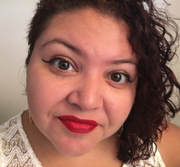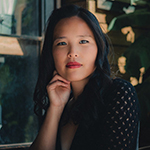a way to ask and to answer
Here’s my mother in June 1968,
a stranger,
as my father describes her,
at her own wedding.
My father claims
he didn’t recognize her.
In the pictures
she looks like a big doll.
Like she’s wearing somebody
else’s hair, this funny dress,
appliqué daisies.
The wedding was in her parents’ living room
in Kenosha, Wisconsin,
a place she’d never lived,
a ceremony conceived
by her mother,
a Foreign Service wife
whose debilitating migraines
were the symptoms of occluded feminism.
In this version of the story.
My father brought out the worst
in his mother-in-law. It was mutual.
He maintains that he and my mother knew
none of the wedding guests
by their first names.
I’ve seen the plasticky photos
only a couple of times.
They’ll disappear for years,
resurface as if in a dream,
vanish again.
At least that’s my impression,
perhaps because I don’t recognize
my parents either.
My father in a suit—anathema.
My mother with a hairstyle—incognito.
The photos were never made into an album.
All my friends
had snuck their parents’
photo albums into their bedrooms.
Social status was late nights
poring over young mothers in flower
crowns and faded Levis,
muttonchopped,
Fu Man Chu’d fathers.
I was always on the outside.
I didn’t think my parents even knew
the term photo album.
This essay fills forgotten corners.
My parents were vegetarian,
but omnivorous in their innocence.
The term hippie was so embarrassing
to my grandmother
that she couldn’t bring herself
to use it, let alone
name my mother.
And my mother,
in the same mold,
modest, decorous, even prudish,
never said she was one.
Although aside from the anomaly
of that wedding,
my parents certainly fit
the profile.
How much easier it is to write
them as types, recognizable.
Here’s my mother at the end of 1974,
nine months pregnant,
in drawstring meditation pants,
her own woodblock-printed tunics.
They’re yoked like peasants,
working a thousand-acre sheep farm
in remote, interior Maine,
snow to the eaves
of the woodstove farmhouse.
These earliest memories of mine are idealized, and vivid.
There was a fortress of wolf-woods
behind the farmhouse and the fields.
My parents had a couple of cows and horses too,
a goat named Cyrus,
a silent silver cat and a fierce,
harness-trained Husky.
Of course I remember the names
of my first cat and dog.
But there have to be some boundaries.
Keep the characters few enough
so they don’t need names
and privacy is a non-issue.
Here’s my mother at the long trestle
table my father built without
a single nail, plotting her order
from the Johnny’s seed catalogue.
She’s a warm blond with poreless
skin and a few freckles, blithely
patrician. Beautiful.
I sat on this essay
for months,
trying to find the right qualifier
for beautiful.
To have a beautiful mother
is to be on intimate terms with Beauty itself, Plato.
But my mother herself has always conflated
it with vanity and materialism,
disparaged any woman who cultivates—
fusses, was her word—
her appearance.
My father too.
I didn’t know,
until I was an adult,
that he found any woman
beautiful.
My father raised barns, yurts, sheep;
my mother was a weaver, gardener, bread-baker
with unabashedly frizzy hair
(she did believe in the hairbrush.
I didn’t see my own curls
until I was a teenager)
and an avid if gentle singing voice.
They played Early Music, lutes and recorders,
with a commune farther up the same dirt road.
Both my sister and I were born on Indian bedspreads
in the living room of the farmhouse,
which makes the whole thing
seem easy to categorize.
Soon enough, back-to-the-land met Eastern Religion,
and we left Maine for California. Warmer weather
is always better for gurus. Worldly possessions tied to the roof-rack,
roadside camping, as if motels were somehow secular.
My mother kept house in the car out of a cardboard box
from a liquor store dumpster that would, in the end,
hold up for eight trips across the country.
When we got to the Bay Area
we lived communally in order to serve a “Living God,”
a supposedly enlightened human.
Then came Waldorf,
all sheeps-wool and beeswax,
a vegetable kingdom purity
that prohibited popular culture
and machine technology.
And elevated innocence,
which I think now
was the main draw.
Are folks
(to use the word my parents
would have used then)
intrinsically part of their generation?
Are they helpless in its current?
And what about a generation of outsiders:
are they all outsiders together?
Of course plenty of hippies were joiners,
lovers, commune-dwellers.
My parents were those things too,
which confounded me.
But my parents themselves
didn’t think they belonged
in any cultural context.
Their outsiderness was original, singular,
and it trumped everything.
In my memory
they’re a little credulous,
a little vain about it.
Something I know now
is that people only respond to a story
if they recognize it.
I believed for a long time
that my parents were unrecognizable.
And how shrilly I desired them to be universal.
I’ve suffered the compulsion to close-read, and often condemn
my parents for almost as long as I can remember,
as if they were my bible and I were a ravenous non-believer.
I’ve wasted years and tears demanding
that they be non-contradictory, rational, up-to-date with the truth.
I imagine ushering in an omniscient narrator
who knows exactly how to cross-examine them
in order to place them at the scene of the crime.
The crime of their own contradiction.
But is it possible the contradiction is simply the child
growing up to be the adult daughter?
My grandmother haunted my first house in Providence.
It was her ghost who woke me
when the washing machine broke during a late-night load
and the basement flooded,
when the baby was at the top of the stairs
working the rungs loose on the landing.
Her own marriage had prevented her
from finishing her Ph.D. in economics,
some time before 1940,
and the birth of my mother, in this version of the story,
precipitated her first nervous breakdown.
I imagine how my grandmother felt herself
to be an outsider too: a math-smart woman,
unusual if not an oxymoron of her time,
a Californian who married New England blue blood,
and then, according to my grandfather’s postings,
a wife and mother in South and Central America.
It’s worth noting that it was she who loved to travel.
At Christmas she disseminated folk trinkets from foreign lands:
carved boxes, woven belts, bangles.
Her signature style was a souvenir t-shirt, men’s small,
sashed smartly at the waist.
And it comes to me now, it seems connected,
that she was the first person I knew
who got a personal computer, in the early 80s.
She had inherited her mother’s house in Laguna Hills
by then and that’s where I remember seeing it,
on the roll-top secretary.
It utterly failed to spark my interest.
My grandfather’s signal Christmas gift
was a New Yorker cover he’d saved over the course
of the year, having deemed it of particular
applicability to the recipient. Call Central Casting
for dead white male, no offense to his ghost,
even before he was one.
The son of a vanilla-distilling,
milk-bottle-inventing,
prep-school-founding line,
he was tall, talkative, square-jawed,
Ivy-Leagued, wry, and confident.
He squeezed our skulls
to give us “credits.”
He was a born orator
but he could mutter something dicey,
side-mouthed,
with perfect Brahmin diction.
He was also sentimental.
Walk, Shepherdess, Walk,
that Girl Scout hymn,
we’ll find the ram with the ebony horn
and the gold-footed ewe,
could render him weepy.
I’m pretty sure he considered himself,
albeit humbly, the consummate insider.
No wonder my father couldn’t get along with him.
After her nervous breakdown
and hospitalization,
my grandmother was forced to send
my mother, a toddler,
to live with her mother,
my great-grandmother,
in California.
I’m stumbling over all these words
with mother in them.
My mother has said that my grandmother
of the men’s small t-shirts
was both ashamed and resentful.
And then when my mother tried to resist
the conventions and formalities of her parents,
she recognized and loathed
the adult daughter
in herself
in a similar way.
This is how the adult daughter is unbecoming
on me: belligerent and babyish,
disgruntled,
complaining,
self-centered.
For a long time
I did indeed complain
about my fringy childhood.
I felt stunted, and mortified
by my culture handicap.
Where my parents had made
the choice to opt out,
I was born weird.
Or so I charged.
It seems embarrassing now.
But by the time I caught up,
the organic milk my mother had pulled from velvet teats
through formidable Maine winters
was available at Walmart,
and there were biodynamic jams on Amazon.
Yoga was stretchy, sexy pants
(although yoga still reminds me of a certain
lungi-wearing guru
and his mushy, bared stomach),
and at least in coastal, urban enclaves like Seattle,
cool school kids, my kids’ friends,
had traded TV cartoons—
epitome of the fast,
loud, and funny world
I was shut out from—
for computer programming on Saturday mornings.
And my mother had grown toward the center
of the culture too. She for whom Simon and Garfunkel
had too much bass, she who sang rounds
without a trace of irony,
purchased rolled oats and brown rice
in hundred-pound brown sacks
from the co-op, had apparently joined
the iHuman race without a backward look.
Here’s my mother in 2009,
her hair practically standing on end
as she simultaneously tracks my sister’s flight
from LA to Seattle where we’re gathered for Christmas,
checks out a sale on wool sweaters,
a psychology blog,
some blistering New York Times comments.
In my childhood,
newspaper was another word,
like photo album,
of which my parents were innocent.
But now my mother has facts at her fingertips,
here she is fogging up the tiny screen with her hot breath,
swooshing her finger pad
up the Pacific coast
between speed
and height
and cloud temperature.
Our conversations worried the subject:
me, betrayed, and her,
stammering excuses
I knew were superficial,
meant only to appease me.
Her distraction when we were on the phone/but she was also on the computer,
I hissed to my husband,
was like talking to friends home with young children,
the adult sentences spliced with toddlerese.
My younger son had a year
of speech therapy, at six,
after growing out of mild deafness,
and the therapist’s highest praise
was that he was “stimulable.”
I was unnerved, at first,
by the mutation of the word,
but then I adopted it greedily,
pejoratively,
to describe my mother.
Where had her austerity gone?
Her outsiderness?
I knew I was being reactive.
Emotional, and controlling.
My mother let me be
who I wanted to be:
I had no right to hold her
to some outdated righteousness.
But I felt like my whole childhood
was at stake,
like she was rewriting
my history.
I originally wrote this essay
with a rather too-neat ending.
My parents had returned to New Hampshire
after another fraught holiday visit,
my sons had gone back to school,
and I could finally hole up in my writing room, my “home office.”
I hummed with the deep pleasure of solitude.
I sat on the floor
(there were few chairs
in my childhood),
covered with a couple of black-sheep brown rugs my mother wove in the 70s.
Maybe it’s a double standard,
but I cherish those rugs,
and one or two forty-year-old sheepskins,
beyond reason.
The literary solution came to me:
my mother’s iPhone
was a room of her own,
something she’d never had
as a young wife and mother of her era.
The trick to these personal essays
is to find your voice
that sounds just like everybody else’s voice.
It lasted about a week,
my cute feminist ending.
But then the metaphor wobbled
(metaphor, or just dragging Virginia Woolf
out of the water) and loosened.
The essay loosens.
The other morning I watched
a washing machine shake itself
to pieces in two minutes
and forty-two seconds
in a back yard in Australia,
on Facebook.
At the end the drum danced around
on its cord for a while.
The cheap metal sides lay
in the grass.
The motor whined
and then the video stopped
and I thought that the only way
to redeem those two minutes
was to gather them up,
and answer them.
I have to back up a little
to make the next turn.
Not so far back
as my parents’ wedding,
but coming from a wider angle.
Our first few months in Seattle
I sent breathless,
hyperbolic missives back east,
announcing pop-out mountains
and soaring evergreens,
pre-historic fernbanks
and blackberries
like blackberry cobbler.
Not far from where we lived in Capitol Hill,
I climbed to the top of Lakeview Cemetery.
The usual topographical hierarchy:
founding Kinnears and Nordstroms
up there, land-grabbing Dennys;
Bruce Lee and Brandon Lee,
side by side.
I could reach out and touch the ivory
facets of two separate mountain ranges.
I was awed;
I was also complicit,
determined to impress myself.
But soon it was winter
like a dripping cold mop-head.
(This time in my life seems ready-made
for baroque description.)
No mountains for months,
and in the cemetery,
people dying far from home,
eternal estrangement.
“Woodman of the World.”
Korean gravestones with all-weather
color photos of the departed.
A coral stone inscribed in Greek
except for “Going Home,”
in English.
The Lees’ shrine littered with tangy cash offerings.
Maybe I’d come west too late. Microsoft peaked, the gold rush city
sold out to suburbia. I thought my husband’s job
at the Gates foundation entitled me to deliver sullen,
even crackpot comments at dinner parties:
Why don’t all the Microsofties come out of early retirement,
try their hands disgorging Bill’s fortune?
Why didn’t anybody tell us the Olympic Peninsula
was strip-logged and haunted?
I began picking
indiscriminately.
The tasteless Tudors.
People were aloof,
unsmiling,
opinion-less.
Big-car-culture,
skinny-bicycle-culture.
No sandy beaches.
Somehow I found a few mom friends
who braved my geographical rancor.
One day, a professor-acupuncturist-woodsprite in a green raincoat
invited me to go for a run.
She asked, rather quixotically,
if I’d been to Denise Levertov’s grave yet.
We trotted up the hill of the cemetery.
It wasn’t hard to find the poet’s resting place:
a charcoal bar of stone with a pale,
wave-licked rock
seemingly balanced on top of it.
Nothing like the surrounding stentorian monoliths.
Cemeteries, like American cars, are no paragon
of design thinking, I heard myself quipping.
What if all the gravestones
were as ergonomic as iPhones?
My friend changed the subject by identifying the Giant Sequoia
that sheltered us, and I could feel myself softening.
Moved by companionship, I made a confession.
My once-hippie mother
(too unwieldy to say she never called herself a hippie)
was now the president of her family burial park,
a bona fide Olmsted in an historic village outside Boston.
The WASPiness of it, I heard myself groan,
and the materialism of death.
My friend giggled.
You’re a long way from home, aren’t you, she offered.
On a rainy Saturday a few weeks later,
I took my husband and sons
to visit the cemetery.
The boys looped
and scattered,
whipping up a game
of find-the-oldest-gravestone.
The mountains weren’t out,
but we reached the top
and there was still a sense of vista,
of being relieved of details,
yet able to see everything.
This happens too fast in the essay,
but I don’t seem to have the chops
to control it.
In real life the moment of discovery
was like a key change,
renewing,
extending
the music.
My older son called out to us.
I could see he was staking out
something important.
It sounds too clever by half, but it’s true:
just a few steps from Denise Levertov’s stone,
my son had found my mother’s ancestors.
The very same ones
who should have been in the burial park
out east (as they say in Seattle),
over which my mother now presided.
How could I have missed them?
Kitty-corner to the poet,
with an unimpeachable family stone
and footprint stones set around it,
my mother’s father’s family,
those insider New Englanders.
Standing on their plot,
their turf,
I imagined for a second
that I had a sort of right to it.
Did it mean
that maybe I wasn’t
such an outsider in Seattle?
That maybe I could drop
the attitude and find common
ground here?
The boys stuck close, reverent.
We read the names of their forebears.
Hanna, Elizabeth, Hiram.
The latest date was 1962.
Just as quickly I felt abandoned.
So they’d come and gone.
Or they’d died out,
so far from home.
My younger son had frozen toes in his REI sandals,
and it was time to finish up the adventure.
The title of this essay is from Levertov,
the last line of a poem called “Immersion:”
Our own words are for us to speak, a way to ask and to answer.
In the late afternoon I called my mother
in New Hampshire. A slightly accusing tone
crept into my voice, as if she’d planted them
there, the Pacific Northwest branch
of the family. I imagined the family tree
spreadsheet at the last reunion I attended.
Let’s say a hundred feet of card tables
in the small-town church basement.
I’d teased my mother:
We’re related to everybody!
We are, she’d coolly retorted.
She cross-checked the Seattle names
in her family tree binder.
I restated that the last one
was buried five decades ago.
They didn’t exactly multiply
and prosper, I insinuated.
Here’s my mysterious
mother, shapeshifter.
Shepherdess
(doubled by the Episcopalian
song beloved of my
grandfather),
Birkenstock Buddhist,
genealogy keeper,
iPhone adept.
Oh, she said,
then tossing it off,
They all married Boeings.
Marriage again:
my mother pointing
to her ancestors’ savvy,
how they homed in,
joined up with what was then
Seattle’s royal family.
It comes to me that writing a personal essay
is like writing a fan letter
to the person you wish you were.
The idea is to make yourself,
against some odds, sympathetic.
The inherent drama: can you reveal yourself
and then transcend yourself
before the eyes of your readers?
Here are my parents now,
grandparents,
in the middle age of old age,
at seventy,
universal in their idiosyncrasy.
Maybe they’re not hypocrites,
after all, just up for change,
like those pioneer ancestors,
and it’s the adult daughter
who will always be outside
their closed circle,
trying to find,
in her own words,
a way to ask
and to answer.
Kirstin Allio is the author of a short-story collection, Clothed Female Figure (Dzanc), and a novel, Garner (Coffee House), a finalist for the LA Times Book Prize for First Fiction. Honors include the National Book Foundation’s 5 Under 35 Award, a PEN/O. Henry Prize, and fellowships from Brown University’s Howard Foundation and the MacDowell Colony. Her fiction, essays, and poems appear most recently in AGNI, The Southern Review, Seneca Review, and Conjunctions, and forthcoming from Prairie Schooner and Fence. She lives in Providence, RI.






